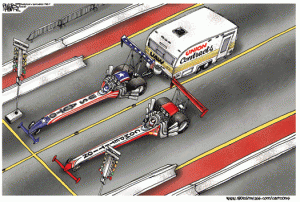We have been reading about the trials of the Big Three auto makers for weeks now. Last week, Fox News had a retired General Motors VP on complaining that GM won the Second World War and so we should be happy to bail them out now. We owe them.
I see almost no mention of the other car makers in the US, like Toyota, Honda, BMW and Mercedes Benz. I guess they don’t need a bailout. The fact remans that hundreds of thousands of cars are made in the US by other companies. What is the big difference between them and the Big Three ?
The United Auto Workers Union.
I was also reading, for the fourth or fifth time, Max Hasting’s history of Overlord, the D-Day invasion. In it, he has a section on the weapons and material of the Allies, compared to the Germans. At one point, he makes a statement that, in every instance, the Allies’ infantry and armor weapons were inferior to the Germans’. The only exception was the Garand rifle, invented by a US Army civilian. The most egregious example was the Sherman tank. I have a book written by a former engineer officer who was assigned to a tank recovery battalion in Normandy in WWII. The title of the book is Deathtrap, the name given to the Sherman by many of its crews. During his service in France and Germany, from the invasion to the end of the war, US armored units suffered 600% losses in Sherman tanks. That is, they lost their entire force of tanks six times over before they were done. The US built 88,000 Sherman tanks (not 40,000 as in that link), of which 40,000 were handed over to the British. Finally, the British equipped the Sherman with a more powerful gun and called those tanks the “Firefly.” The British Sherman crews called the tank “Tommy cookers” and “Ronsons.” Both names referred to the tendency of the tank to catch fire easily when hit.
My point in relating this bit of military history (although it may be news to some) is to make a point. After the war, US auto makers quickly resumed civilian production and were unsurpassed in the auto business until the 1970s when German and Japanese auto makers had recovered from war damage and had caught up with superior designs. The US auto makers excelled in making large numbers of mediocre cars and tanks. They were not innovative. The Germans designed and built the Tiger tank, whose proper name was panzerkampfwagen VI, in three years, the same time frame in which the Sherman was designed and built.
What we have now is an industry that is second generation Industrial Age, heavily burdened with old union contracts and pension obligations, trying to compete with fourth generation industries. It excelled in building large numbers on long, fixed assembly lines. Henry Ford established that pattern in the 1920s. They have not improved upon his work since. A bailout will begin the socialization of American industry with five year plans and all the accoutrements of a planned economy.
UPDATE: Here is more on the rest of the auto industry, which has been very much ignored by Washington. I’m sure they hope it continues.
